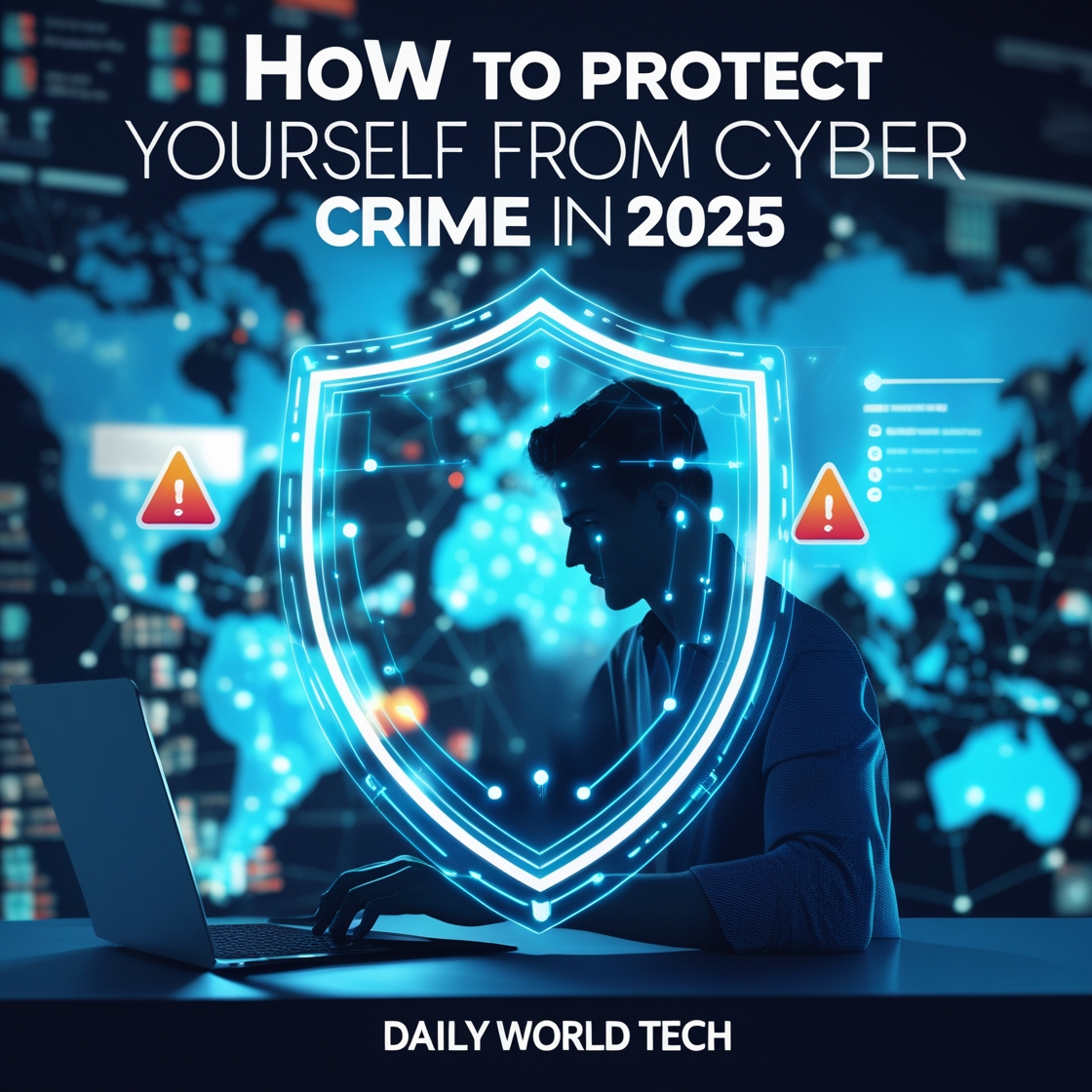Living in a hyper-connected digital environment, Cyber Crime has become one of the most topical threats to individuals, businesses, and governments alike. As technology has been evolving, new and advanced methods of cybercriminals to exploit digital vulnerability emerge. In the year 2025, it is more important than ever to defend yourself against these cyber-attacks on the net. As a web surfer or as a company that deals with confidential information, knowing how to protect yourself is the key to survival in the contemporary internet environment.
What is Cyber Crime?
Cyber crime is any activity carried out with the use of the internet or any other digital platform illegally. Such crimes include stealing data, financial crimes, identity thefts, cyberbullying, online frauds, phishing, ransomware, and hacking. Cyber crime is not restricted to a physical location unlike traditional crime, that is, it is simple, quick, and risky.
By the year 2025, the level of cyber crime is at its peak. Global cybersecurity reports show that the world would lose more than 10 trillion dollars annually due to cyber crime by the end of this year. Digital threats do not spare anyone, including ordinary people or multinational corporations.
Categories of Cyber Crime You Should Learn
A proper protection will be possible only after getting to know about the most frequent forms of cyber crimes in 2025:
1. Phishing Attacks
Such scams get hold of you by making you send personal information like your password, bank information, or social security numbers in fake emails or websites.
2. Ransomware
It is a form of malware, which locks up your data and holds it ransom without access. By 2025, ransomware has been advanced with AI, and it has become difficult to identify.
3. Identity Theft
When hackers steal your personal information, they will use them to masquerade you, usually to achieve financial gain or carry out other fraudulent acts.
4. Cyberbullying and Online Harassment
These are the threats, blackmail, and slandering with the help of social media, messaging applications, or email.
5. Data Breaches
Massive theft of personal data of users, which is usually sold in the deep web.
6. Cryptocurrency Scams
With the introduction of the popular aspect of the digital currency, bogus trading outlets and investment frauds are highly prevalent.
The Reasons Why Cyber Crime is More Dangerous in the Year 2025
There have been several technological developments that have contributed to the increased danger and ease of committing the crimes; cyber crime:
- Attacks are being automated and hampered to appear human-like with the use of Artificial Intelligence (AI).
- Deepfakes may fake identities and deceive others using bogus audio and video.
- Smart TVs, refrigerators, etc., and even vehicles are becoming entry points of hackers.
- Remote Work Culture has also constituted the oblivion of the barrier between individual and business-related information security.
- The potency of cybercriminals is enhanced by weak Cyber Laws in most countries that make prosecution of cybercriminals difficult.
With these issues in mind, it is good to actively pursue the protection of your digital presence.
Cyber Crime 2025: What You Can Do to Defend Yourself
1. Administer Effective and Distinctive Passwords
Your initial defense is the passwords. It is the year 2025 and password-hacking programs have reached new heights. Mix symbols, uppercase, lowercase, and numbers. Do not use personal data, such as birthdays or pet names.
Hack: Save and create secure and complicated passwords with the help of a password manager.

2. Structuring Two-Factor Authentication (2FA)
2FA provides an additional security to your accounts. Even supposing the password of your account is stolen, they still cannot log in without the secondary confirmation process, which is often performed and viewed through the phone or mail.
Best Practice: Secure 2FA on every account, particularly emails, bank, and social media.
3. Stay Current on Software and Devices
Make sure that you always have the latest updates on the operating system, browsers, apps, and antivirus. The systems that are left without updates are an easy target to cybercriminals.
Pro Tip: Turn on automatic updates on all devices to stay protected without the hassle.
4. Never Use Links and Emails That Are Suspicious
Phishing has turned out to be highly sophisticated. Never give in to a temptation to click on unfamiliar links or download the attachment of unknown origins, even despite the fact that they might belong to ostensibly legit organizations.
Be on the alert of red flags such as:
- Spelling errors
- Sense of urgency
- Impersonal greetings (e.g. Dear Customer)
5. Install a Good Antivirus/Firewall
An antivirus will be able to detect the known threat and block it in time, whereas a firewall will not allow access to your device or network to unauthorized users. By 2025, artificial intelligence-based antivirus programs provide on-demand security with emerging threats.
Recommended softwares: Bitdefender, Norton 360, Kaspersky, Windows Defender (have the Firewall option turned ON).
6. Watch Out with the Internet Cafés
Cafés, airports, and other public networks are not always secure. Data on such networks is prone to thousands of hackers.
Solution: Whenever utilizing a free wire-free network, always use a Virtual Private Network (VPN). VPN scrambles data and masks your IP address.
7. Learn Yourself and Your Family
It should be aware of cybersecurity. Get acquainted with the most recent tricks and educate your family members (children and seniors, especially) in proper internet use.
Recommended Practices:
- Do not share too much information on social media
- Train children on how not to click unfamiliar links
- Talk about app and game privacy settings

8. Be Smarter About Your Smart Devices
Smart homes are becoming more and more vulnerable as IoT grows. Smart speakers, thermostats, and security cameras are some of the devices that are vulnerable to hacking when they are not secured.
Tips:
- Change the default passwords at once
- Upgrade firmware on a regular basis
- Separate Wi-Fi network must be used with IoT devices
9. More Frequently Check Your Accounts
Check your bank statements, email accounts, and internet traffic regularly to monitor any suspicious practices.
Action Steps:
- Set up transaction alerts with your bank
- Use tools like Google’s “Security Checkup”
- Enable login notifications for suspicious activity
10. Save a Back-Up of Your Data
When a ransomware or system failure occurs, backups will help. In the event of the failure or attack, you will not lose important files.
The Most Appropriate Backup Plans:
- Make use of cloud storage such as Google Drive, Dropbox or iCloud
- Have an encrypted hard drive physically backup
- Automate weekly or monthly backups
11. Encrypted Messaging Programs
Full privacy may not be provided by regular messaging services. Your chats are hidden in the encrypted applications.
Safe Messaging Apps in 2025:
- Signal
- Secret Chat (Telegram)
- WhatsApp (end-to-end encryption)
12. Be Current with the Trends on Cyber Crime
It appears that new forms of threats occur annually. Follow cybersecurity blogs and YouTube channels or use Google Alerts to be notified about the news in the realm of cyber crime.
Trusted Resources:
- Cybersecurity & Infrastructure Security Agency (CISA)
- Krebs on Security
- ThreatPost
- Wired (Security section)
Prosecution and Reporting on Cyber Crime
In case you fall a victim, report the crime. Countries today have developed special cyber crime departments.
Action:
- Take note of the incident by reporting to your local cyber crime cell
- Keep documentations screenshots, transaction or mails
- Contact your bank when money data is lost
- Register a police complaint or an online one (according to law in your country)
In Pakistan, as an example, you could report to NR3C (National Response Centre of Cyber Crime) that falls under FIA (Federal Investigation Agency).
Website: www.nr3c.gov.pk

AI and Cybersecurity in 2025
AI is not only a menace as it develops alongside it is an ally of some strength in the fight against cyber crime. Advanced cyber security applications apply machine learning to identify atypical patterns, discover fraud, and act against threats in real time.
AI-based Security Benefits:
- Predictive threat modeling
- Automated incident response
- Real-time phishing detection
Remember, cybersecurity isn’t a one-time action it’s a continuous mindset. Stay informed. Stay secure.















